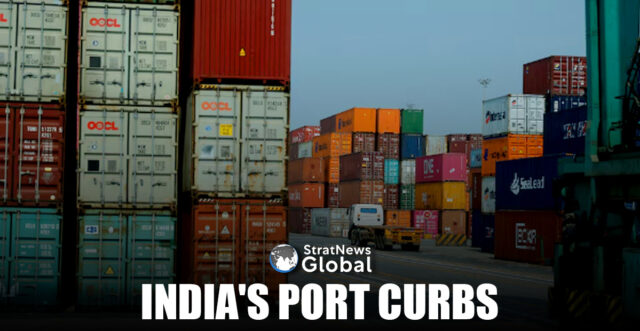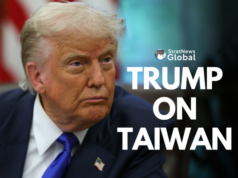In a tit-for-tat response to Bangladesh‘s recent restrictions on Indian goods, the Government of India on Saturday announced new port curbs on specific imports from Bangladesh, including readymade garments and processed food products.
The decision follows Dhaka’s move last month to restrict Indian exports through certain land ports, particularly those bordering India’s northeastern states.
Curbs Effective Immediately
According to a notification issued by the Directorate General of Foreign Trade (DGFT), the new curbs are effective immediately and apply to imports from Bangladesh except those transiting through India en route to Nepal and Bhutan.
The order specifies that imports of readymade garments from Bangladesh will now be permitted only through the seaports of Nhava Sheva and Kolkata, while land port access for such goods has been revoked.
For other items like fruits, carbonated drinks, processed foods (such as snacks and confectionery), cotton waste, plastic goods, dyes, and wooden furniture, shipments will no longer be allowed through Land Customs Stations (LCSs) and Integrated Check Posts (ICPs) in Assam, Meghalaya, Tripura, Mizoram, and certain checkpoints in West Bengal.
However, the DGFT clarified that essential imports such as fish, LPG, edible oil, and crushed stone from Bangladesh are exempt from these port restrictions.
Trade Policy Parity Enforced
The Ministry of Commerce said the move amends India’s import policy framework with respect to Bangladeshi goods and is aimed at ensuring parity and fairness in bilateral trade.
This development comes in the wake of growing tensions between New Delhi and Dhaka, exacerbated by a controversial remark made by Bangladesh’s interim government head, Muhammad Yunus, during his recent visit to China.
Yunus claimed that India’s northeastern states are landlocked and dependent on access through Bangladesh to reach global markets—comments that sparked backlash across the Indian political spectrum.
Transit Facility Revoked
Following Yunus’s remarks, India on April 9 revoked a key transhipment facility that had allowed Bangladesh to export goods to third countries via Indian ports, excluding Nepal and Bhutan.
Indian apparel exporters had also been urging the government to respond to Bangladesh’s discriminatory trade practices, particularly in the textile sector, where the two countries are direct competitors. Bangladesh exported over $700 million worth of garments to India in 2023–24.
Indian officials said that Bangladesh has increasingly imposed logistical bottlenecks on Indian exports—halting yarn shipments via land ports, intensifying customs checks, and recently blocking rice exports through the Benapole ICP.
These moves have negatively impacted the economic prospects of India’s northeastern states, which are already burdened by high transit costs and limited market access to Bangladesh for their manufactured goods.
(With inputs from IBNS)





